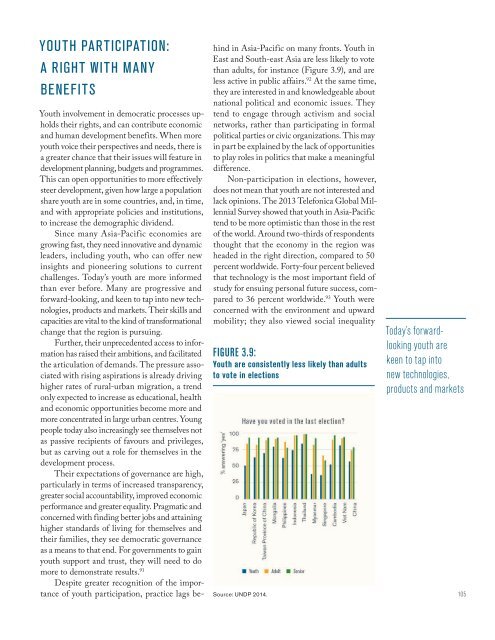SHAPING THE FUTURE HOW CHANGING DEMOGRAPHICS CAN POWER HUMAN DEVELOPMENT
1VPo4Vw
1VPo4Vw
You also want an ePaper? Increase the reach of your titles
YUMPU automatically turns print PDFs into web optimized ePapers that Google loves.
YOUTH PARTICIPATION:<br />
A RIGHT WITH MANY<br />
BENEFITS<br />
Youth involvement in democratic processes upholds<br />
their rights, and can contribute economic<br />
and human development benefits. When more<br />
youth voice their perspectives and needs, there is<br />
a greater chance that their issues will feature in<br />
development planning, budgets and programmes.<br />
This can open opportunities to more effectively<br />
steer development, given how large a population<br />
share youth are in some countries, and, in time,<br />
and with appropriate policies and institutions,<br />
to increase the demographic dividend.<br />
Since many Asia-Pacific economies are<br />
growing fast, they need innovative and dynamic<br />
leaders, including youth, who can offer new<br />
insights and pioneering solutions to current<br />
challenges. Today’s youth are more informed<br />
than ever before. Many are progressive and<br />
forward-looking, and keen to tap into new technologies,<br />
products and markets. Their skills and<br />
capacities are vital to the kind of transformational<br />
change that the region is pursuing.<br />
Further, their unprecedented access to information<br />
has raised their ambitions, and facilitated<br />
the articulation of demands. The pressure associated<br />
with rising aspirations is already driving<br />
higher rates of rural-urban migration, a trend<br />
only expected to increase as educational, health<br />
and economic opportunities become more and<br />
more concentrated in large urban centres. Young<br />
people today also increasingly see themselves not<br />
as passive recipients of favours and privileges,<br />
but as carving out a role for themselves in the<br />
development process.<br />
Their expectations of governance are high,<br />
particularly in terms of increased transparency,<br />
greater social accountability, improved economic<br />
performance and greater equality. Pragmatic and<br />
concerned with finding better jobs and attaining<br />
higher standards of living for themselves and<br />
their families, they see democratic governance<br />
as a means to that end. For governments to gain<br />
youth support and trust, they will need to do<br />
more to demonstrate results. 91<br />
Despite greater recognition of the importance<br />
of youth participation, practice lags behind<br />
in Asia-Pacific on many fronts. Youth in<br />
East and South-east Asia are less likely to vote<br />
than adults, for instance (Figure 3.9), and are<br />
less active in public affairs. 92 At the same time,<br />
they are interested in and knowledgeable about<br />
national political and economic issues. They<br />
tend to engage through activism and social<br />
networks, rather than participating in formal<br />
political parties or civic organizations. This may<br />
in part be explained by the lack of opportunities<br />
to play roles in politics that make a meaningful<br />
difference.<br />
Non-participation in elections, however,<br />
does not mean that youth are not interested and<br />
lack opinions. The 2013 Telefonica Global Millennial<br />
Survey showed that youth in Asia-Pacific<br />
tend to be more optimistic than those in the rest<br />
of the world. Around two-thirds of respondents<br />
thought that the economy in the region was<br />
headed in the right direction, compared to 50<br />
percent worldwide. Forty-four percent believed<br />
that technology is the most important field of<br />
study for ensuing personal future success, compared<br />
to 36 percent worldwide. 93 Youth were<br />
concerned with the environment and upward<br />
mobility; they also viewed social inequality<br />
FIGURE 3.9:<br />
Youth are consistently less likely than adults<br />
to vote in elections<br />
Source: UNDP 2014.<br />
Today’s forwardlooking<br />
youth are<br />
keen to tap into<br />
new technologies,<br />
products and markets<br />
105


